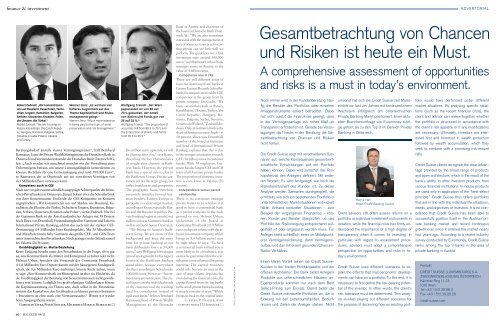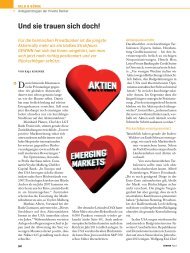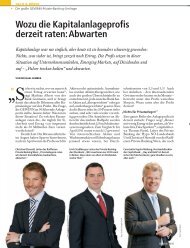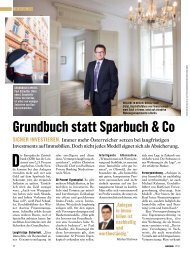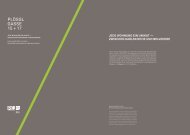Download (pdf) - Private Banking
Download (pdf) - Private Banking
Download (pdf) - Private Banking
Erfolgreiche ePaper selbst erstellen
Machen Sie aus Ihren PDF Publikationen ein blätterbares Flipbook mit unserer einzigartigen Google optimierten e-Paper Software.
finance & investment<br />
Robert Zadrazil: „Wir konzentrieren<br />
uns auf Russland, Kasachstan, tschechien,<br />
Ungarn, Rumänien, Bulgarien,<br />
Serbien, Slowenien, Kroatien, Polen,<br />
die Ukraine, die türkei.“<br />
robert zadrazil: “We are focusing on<br />
russia, kazakhstan, the czech republic,<br />
hungary, romania, Bulgaria, serbia,<br />
slovenia, croatia, poland, ukraine<br />
and turkey.”<br />
Beratungsbedarf anstelle starrer Vermögensgrenzen“, hält Bernhard<br />
Ramsauer, Leiter des <strong>Private</strong> Wealth Managements der deutschen Bank in<br />
Österreich und Vorstandsvorsitzender der deutschen Bank Österreich AG,<br />
fest. „Auch werden wir manchmal zunächst mit der Verwaltung eines<br />
Teilvermögens betraut, um unsere Leistungsfähigkeit kennenlernen zu<br />
können. Richtlinie für eine erstveranlagung sind rund 500.000 euro“,<br />
so Ramsauer, der in Österreich auf ein verwaltetes Vermögen von<br />
vier Milliarden euro verweisen kann.<br />
Kompetenz auch in CEE<br />
Nach wie vor gibt es unterschiedlich ausgeprägte Schwerpunkte der heimischen<br />
Privatbanken in Osteuropa. Jüngst bekam etwa die Schoellerbank<br />
von ihrer Konzernmutter unicredit die cee-Kompetenz im Konzern<br />
zugesprochen. „Wir konzentrieren uns auf Märkte wie Russland, Kasachstan,<br />
die ukraine, die Türkei, Tschechien, ungarn, Rumänien, Bulgarien,<br />
Serbien, Slowenien, Kroatien oder Polen“, verrät Zadrazil. Nur bei<br />
der Gutmann Bank ist der Anteil ausländischer Anleger mit 50 Prozent<br />
hoch. Ilinca von derenthall, Vorstandsmitglied bei Gutmann und Leiterin<br />
International <strong>Private</strong> <strong>Banking</strong>, erklärt das auch mit der starken cee-<br />
Orientierung (14 Milliarden euro Kundengelder). Mit 30 Mitarbeitern<br />
und Mitarbeiterinnen habe Gutmann das größte cee- und GuS-Team<br />
unter österreichischen Privatbanken. Noch geringer ist der Inländeranteil<br />
bei Valartis (20 Prozent).<br />
Unabhängigkeit vs. Mutterbeziehung<br />
Keine einigung besteht unter den Privatbanken in der Frage, ob es gut<br />
sei, eine Kommerzbank als Mutter im Hintergrund zu haben oder nicht.<br />
Helmut urban, Sprecher des Vorstands der constantia Privatbank<br />
(11,8 Milliarden euro depotvolumen mit der hauseigenen Fondsgesellschaft,<br />
die 8,6 Milliarden euro mitbringt), könnte Recht haben, wenn<br />
er sagt: „eine Kommerzbank im Hintergrund ist eher ein Hindernis, da<br />
die unabhängigkeit der Beratung von Konzerninteressen nicht gewährleistet<br />
sein könnte. Lediglich bei großvolumigen Geldeinlagen könnte<br />
die Kapitalausstattung ein Thema sein, doch selbst in der Finanzkrise<br />
strömte das Kapital von den Großbanken zu kleinen privaten Instituten<br />
– Investieren ist eben stark eine Vertrauenssache.“ Womit wir wieder<br />
beim Ausgangsthema wären.<br />
christian Vavra, Peter Nestler, Mitarbeit: Harald Hornacek �<br />
60 Succeed 04/11<br />
Werner Zenz: „Es wird ein viel<br />
höheres Augenmerk auf das<br />
thema Kapitalerhalt und Risikomanagement<br />
gelegt.“<br />
Werner zenz: “much more attention<br />
is being paid to the topic of asset<br />
preservation and risk management.”<br />
Wolfgang traindl: „Der Wertpapieranteil<br />
ist von 80 auf<br />
70 % gesunken, der Anteil<br />
von Aktien und fonds gar von<br />
35 auf 25 %.“<br />
Wolfgang traindl: “the proportion of<br />
securities fell from 80 % to 70 % and<br />
the proportion of shares and funds<br />
from 35 % to 25 %.”<br />
five million euros upwards, we will<br />
be chasing after you,” says Kraus,<br />
describing the key characteristics<br />
of sought-after clientele at Kathrein<br />
bank. However, the private<br />
bank has a special role to play in<br />
the Raiffeisen Group. <strong>Private</strong> customers<br />
are not the target group, but<br />
rather foundations and companies.<br />
The geographic focus, therefore,<br />
necessarily stretches beyond Austrian<br />
borders. eastern europe in<br />
particular is a clear target market,<br />
according to Kraus, especially Russia<br />
and the Russian republics. <strong>Private</strong><br />
banking begins at around one<br />
million euros at Gutmann bank as<br />
well as at credit Suisse Österreich.<br />
“We belong to Austria’s Raiffeisen<br />
Group. We are aware of this<br />
background and keep the entry<br />
limit for private banking at our<br />
bank deliberately low – at 50,000<br />
euros,” says Wolfgang Schweissgut<br />
almost apologetically. In this regard,<br />
however, the Raiffeisen bankers<br />
stand alone, because everywhere<br />
else there is nothing to be had under<br />
100,000 euros. However: “Investment<br />
sums are not decisive. The crucial<br />
factors are the individual needs<br />
of the customer and the resulting<br />
need for consultation instead of<br />
rigid asset limits,” believes Bernhard<br />
Ramsauer, head of <strong>Private</strong> Wealth<br />
Management at the deutsche<br />
Bank in Austria and chairman of<br />
the board at deutsche Bank Österreich<br />
AG. “We are also sometimes<br />
entrusted with the management of<br />
part of someone’s assets at first, so<br />
that person can see how well we<br />
perform. The guidelines for a first<br />
investment state around 500,000<br />
euros,” says Ramsauer, whose bank<br />
manages assets in Austria to the<br />
value of 4 billion euros.<br />
Competence also in CEE<br />
There are still different areas of<br />
focus for Austrian private banks in<br />
eastern europe. Recently Schoellerbank,<br />
for instance, received the cee<br />
competence in the group from its<br />
parent company unicredit. “We<br />
focus on markets such as Russia,<br />
Kazakhstan, ukraine, Turkey, the<br />
czech Republic, Hungary, Romania,<br />
Bulgaria, Serbia, Slovenia,<br />
croatia and Poland,” Zadrazil discloses.<br />
Only at Gutmann bank is the<br />
share of foreign investors high – at<br />
50 percent. Ilinca von derenthall,<br />
member of the board at Gutmann<br />
and head of International <strong>Private</strong><br />
<strong>Banking</strong> explains that this is due<br />
to the stronger orientation towards<br />
cee (14 billion euros in customer<br />
funds). With 30 employees, Gutmann<br />
has the largest cee and cIS<br />
team of all Austrian private banks.<br />
The proportion of domestic investors<br />
is even lower at Valartis (20<br />
percent).<br />
Independence versus parent<br />
relationship<br />
There is no consensus amongst<br />
private banks as to whether it is<br />
good to have a commercial bank<br />
as a parent company in the back<br />
ground or not. Helmut urban,<br />
spokesman of the board at<br />
constantia Privatbank (11.8 billion<br />
euros in deposit volume with the inhouse<br />
investment company, which<br />
brings in 8.6 billion euros) may<br />
be right when he says: “To have<br />
a commercial bank behind you is<br />
more likely to be a hindrance, as it<br />
cannot be guaranteed that the consultation<br />
is not influenced by group<br />
interests. The capital resources<br />
could only become an issue in the<br />
case of large-volume deposits; but<br />
even during the financial crisis, the<br />
capital flowed from the big banks<br />
to the small private banks. Investing<br />
is simply a matter of trust.” Which<br />
brings us back to the original issue.<br />
c. Vavra, P. Nestler, with<br />
suppurt from: H. Hornacek �<br />
Fotos: lichtstark.com, picturedesk.com


